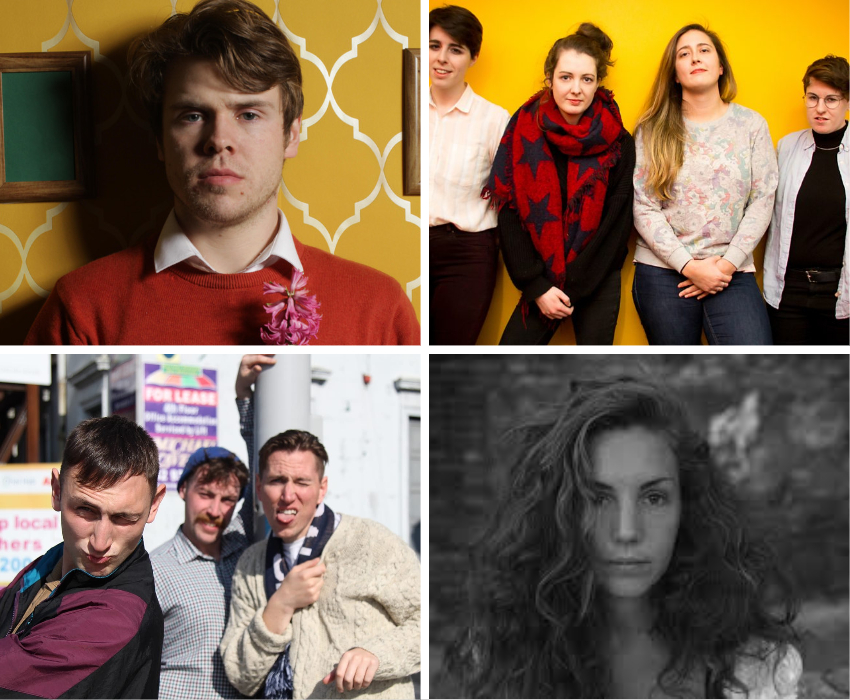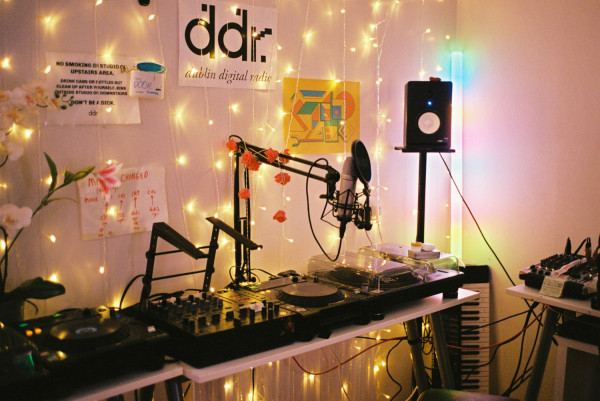
There’s no telling what exactly the consequences of the coronavirus pandemic will be for the music industry.
What’s absolutely certain is that the lockdown has caused significant changes in the lives of artists all over the world. From tour or release cancellations and postponements, to remote recording and a huge rise in live-streamed gigs, musicians are navigating lockdown with just as much ingenuity as those in other sectors.
Perhaps the most difficult consequence for the music world to come to terms with is the cancellation of live gigs for an indefinite period of time. Many bands who typically spend all their time together rehearsing or touring have had to figure out how to work remotely together. In an email, Rachel Lyons, the drummer for Dublin band Pillow Queens, writes “isolation has affected us all differently but the most common theme amongst the PQs is that we can’t all be together and that’s hard. We all miss one another and each other’s smells dearly”.
The band are also approaching the release of their debut album, and though they missed out on some important festival slots and their fees, they feel encouraged by the hopeful spirit across the music scene that it will still be released as planned, despite delays in planning and finance. Lyons says that “people have been very kind across the music scene as a whole and hopefully we’ll recoup some of those lost earnings and give our album the release it deserves.”
A commitment from volunteers and presenters to keeping the radio station on air has seen them taking calls day and night
The importance of collective spirit expressed by Pillow Queens is not exclusive to artists working in bands, though – Rachel Kiersey, of Dublin Digital Radio, tells me the dedication of presenters and volunteers alike has been crucial as the station has adapted to the circumstances we find ourselves in. “A commitment from volunteers and presenters to keeping the radio station on air has seen them taking calls day and night, dealing with queries, preparing a schedule that is often revised daily, troubleshooting, looking for new solutions in delivering live radio and even working to incorporate live calls on air.”
Dublin Digital Radio is an invaluable platform for Irish music and presenters of all genres, and Kiersey attests to the importance of the continued availability of music at a time like this. “The key thing is to keep the music and other content going, and work to try keep people’s spirits up and some kind of familiarity going.”
Over the course of the pandemic, conversations have been rife about the effects of lockdown on creativity and creative output. The sudden change from never having enough time to work to having nothing but huge amounts of free time has an inevitable effect on not just the artwork itself, but on how it will be presented – especially in terms of music, which for the first time cannot bring people together in the comfort of a shared live experience.
Wicklow native Anna Mieke, whose song “Warped Window” closed out the first episode of Normal People, writes in an email about how lockdown has changed her creative process. “I think I’m enjoying the time to work on and practise things I don’t usually do”, she says. “I actually find it easier to write songs or feel inspired when it happens ‘between things’, in the spaces between my other activities.”

Rachel Kiersey, of Dublin Digital Radio, says the dedication of presenters and volunteers has been crucial as the station has adapted to the pandemic.
“Like, during my masters, the moments between reading or assignments or whatever else, ended up being more ‘productive’ than a whole day spent on actively trying to write songs.”
Our minds are so focused now on capitalising on this time to write or produce work that it can sometimes freeze up the flow of creativity. For Mieke, when life is busier, “there’s an element of your mind being somewhat distracted and not being so analytical about what you’re coming up with musically”. The loosened boundaries of time are sure to have a profound effect on the kind of music created during and after lockdown.
Ronan Kealy, known by moniker Junior Brother, also had to find new ways to “keep the blood flowing”. For him, “odd jobs around the house” have gone on alongside writing or practising. These, he writes, are “rewarded occasionally by an alcoholic beverage or two”. I share his prediction that live-streamed gigs run by Dundalk band the Mary Wallopers will “go down as legendary” after this is all over.
The live performances run by the Louth outfit have featured regular streams of tunes and chat and have featured different guest artists, including Kealy himself and more recently Dublin pop artist CMAT.
The light is just around the bend; to get there quicker we just need to stay a little bit longer in the dark
Other live-streamed events include the National Gallery’s series “Courage”, which has seen incredible performances from the likes of Denise Chaila, whose performance is especially stunning.
Kealy says the positivity and community spirit displayed by these shows is crucial to getting through lockdown, and his take on keeping strong in trying times is worth noting: “The light is just around the bend; to get there quicker we just need to stay a little bit longer in the dark.”
The pandemic has shaken the music industry to its very core, and we are all missing that collective comfort of being physically together in the presence of live performance. There is certainly a lot to look forward to, however, as this is a time for mining ideas and feelings into what will undoubtedly be an entirely new era of new and innovative music and performance.






